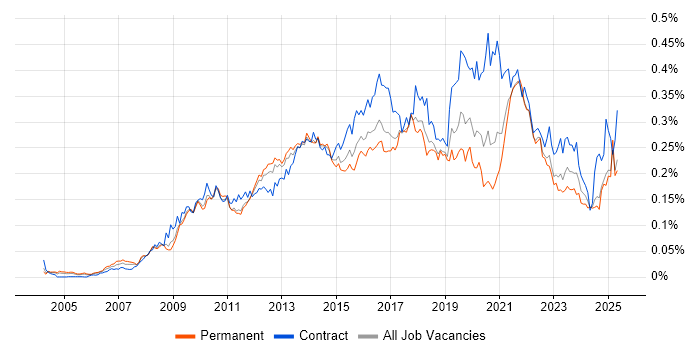Master Data Management
UK > UK excluding London
The table below provides summary statistics for permanent job vacancies advertised in the UK excluding London requiring Master Data Management skills. It includes a benchmarking guide to the annual salaries offered in vacancies that cited Master Data Management over the 6 months leading up to 30 May 2025, comparing them to the same period in the previous two years.
| 6 months to 30 May 2025 |
Same period 2024 | Same period 2023 | |
|---|---|---|---|
| Rank | 500 | 660 | 678 |
| Rank change year-on-year | +160 | +18 | -2 |
| Permanent jobs citing Master Data Management | 77 | 111 | 77 |
| As % of all permanent jobs advertised in the UK excluding London | 0.20% | 0.15% | 0.13% |
| As % of the Processes & Methodologies category | 0.21% | 0.18% | 0.14% |
| Number of salaries quoted | 26 | 89 | 46 |
| 10th Percentile | £25,625 | £52,325 | £41,250 |
| 25th Percentile | £26,250 | £59,300 | £51,438 |
| Median annual salary (50th Percentile) | £37,500 | £82,500 | £57,500 |
| Median % change year-on-year | -54.55% | +43.48% | -3.74% |
| 75th Percentile | £67,500 | £90,000 | £69,469 |
| 90th Percentile | £83,750 | £101,491 | £85,000 |
| UK median annual salary | £65,000 | £80,000 | £72,500 |
| % change year-on-year | -18.75% | +10.34% | -3.33% |
All Process and Methodology Skills
UK excluding London
Master Data Management falls under the Processes and Methodologies category. For comparison with the information above, the following table provides summary statistics for all permanent job vacancies requiring process or methodology skills in the UK excluding London.
| Permanent vacancies with a requirement for process or methodology skills | 36,483 | 61,419 | 55,450 |
| As % of all permanent jobs advertised in the UK excluding London | 92.65% | 82.37% | 95.58% |
| Number of salaries quoted | 17,392 | 42,187 | 28,711 |
| 10th Percentile | £26,250 | £27,250 | £30,500 |
| 25th Percentile | £36,750 | £36,250 | £40,000 |
| Median annual salary (50th Percentile) | £51,574 | £50,000 | £55,000 |
| Median % change year-on-year | +3.15% | -9.09% | +4.76% |
| 75th Percentile | £65,000 | £65,000 | £70,000 |
| 90th Percentile | £77,500 | £77,500 | £82,500 |
| UK median annual salary | £57,443 | £55,000 | £60,899 |
| % change year-on-year | +4.44% | -9.69% | +1.50% |
Master Data Management
Job Vacancy Trend in the UK excluding London
Job postings citing Master Data Management as a proportion of all IT jobs advertised in the UK excluding London.

Master Data Management
Salary Trend in the UK excluding London
3-month moving average salary quoted in jobs citing Master Data Management in the UK excluding London.
Master Data Management
Salary Histogram in the UK excluding London
Salary distribution for jobs citing Master Data Management in the UK excluding London over the 6 months to 30 May 2025.
Master Data Management
Job Locations in the UK excluding London
The table below looks at the demand and provides a guide to the median salaries quoted in IT jobs citing Master Data Management within the UK excluding London region over the 6 months to 30 May 2025. The 'Rank Change' column provides an indication of the change in demand within each location based on the same 6 month period last year.
| Location | Rank Change on Same Period Last Year |
Matching Permanent IT Job Ads |
Median Salary Past 6 Months |
Median Salary % Change on Same Period Last Year |
Live Jobs |
|---|---|---|---|---|---|
| South East | +125 | 55 | £82,500 | +11.86% | 98 |
| North of England | +23 | 11 | £37,500 | -58.33% | 66 |
| Midlands | +65 | 8 | £26,750 | -57.34% | 54 |
| Yorkshire | +63 | 6 | £46,250 | - | 28 |
| East Midlands | +51 | 6 | £26,750 | - | 23 |
| North West | -23 | 5 | £37,500 | -58.33% | 31 |
| West Midlands | +32 | 2 | £62,500 | -0.32% | 27 |
| South West | +93 | 1 | £85,000 | -2.86% | 32 |
| East of England | +43 | 1 | £32,500 | -67.15% | 41 |
| Wales | +42 | 1 | £35,000 | -36.47% | 6 |
| Master Data Management UK |
|||||
Master Data Management
Co-occurring Skills and Capabilities in the UK excluding London by Category
The follow tables expand on the table above by listing co-occurrences grouped by category. The same employment type, locality and period is covered with up to 20 co-occurrences shown in each of the following categories:
